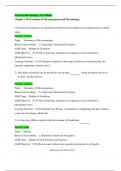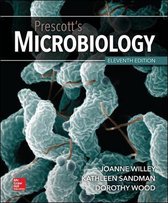Prescott's Microbiology, 11e (Willey)
Chapter 1 The Evolution of Microorganisms and Microbiology
1) Extant microorganisms are organisms from the fossil record that are no longer present on Earth
today.
Answer: FALSE
Topic: Taxonomy of Microorganisms
Bloom's/Accessibility: 2. Understand / Keyboard Navigation
ASM Topic: Module 01 Evolution
ASM Objective: 01.05 The evolutionary relatedness of organisms is best reflected in
phylogenetic trees.
Learning Outcome: 01.02a Propose a timeline of the origin and history of microbial life and
integrate supporting evidence into it
2) All cellular organisms can be placed into one of three , which include the Bacteria,
Archaea, and the Eukarya.
Answer: domains
Topic: Taxonomy of Microorganisms
Bloom's/Accessibility: 2. Understand / Keyboard Navigation
ASM Topic: Module 01 Evolution
ASM Objective: 01.05 The evolutionary relatedness of organisms is best reflected in
phylogenetic trees.
Learning Outcome: 01.01b Explain Carl Woeses contributions in establishing the three-domain
system for classifying cellular life
3) Archaea are cellular organisms that have unique cell membrane .
Answer: lipids
Topic: Archaea
Bloom's/Accessibility: 1. Remember / Keyboard Navigation
ASM Topic: Module 02 Cell Structure and Function
ASM Objective: 02.03 Bacteria and Archaea have specialized structures (e.g. flagella,
1
MedConnoisseur 2020 © 2022
,endospores, and pili) that often confer critical capabilities.
Learning Outcome: 01.01c Determine the type of microbe (e.g., bacterium, fungus, etc.) when
given a description of a newly discovered one
4) Microbiologists study a variety of organisms, but all are considered either Bacteria or Archaea.
Answer: FALSE
Topic: Taxonomy of Microorganisms
Bloom's/Accessibility: 2. Understand / Keyboard Navigation
ASM Topic: Module 05 Microbial Systems
ASM Objective: 05.04 Microorganisms, cellular and viral, can interact with both human and
nonhuman hosts in beneficial, neutral or detrimental ways.
Learning Outcome: 01.01a Define the term microbiology
5) All eukaryotes have a membrane-delimited nucleus.
Answer: TRUE
Topic: Taxonomy of Microorganisms
Bloom's/Accessibility: 2. Understand / Keyboard Navigation
ASM Topic: Module 02 Cell Structure and Function
ASM Objective: 02.04 While microscopic eukaryotes (for example, fungi, protozoa and algae)
carry out some of the same processes as bacteria, many of the cellular properties are fundamentally
different.
Learning Outcome: 01.01c Determine the type of microbe (e.g., bacterium, fungus, etc.) when
given a description of a newly discovered one
6) Viruses are not generally studied by microbiologists because they are not classified as living
organisms.
Answer: FALSE
Topic: Taxonomy of Microorganisms
Bloom's/Accessibility: 2. Understand / Keyboard Navigation
2
MedConnoisseur 2020 © 2022
,ASM Topic: Module 05 Microbial Systems
ASM Objective: 02.05 The replication cycles of viruses (lytic and lysogenic) differ among
viruses and are determined by their unique structures and genomes.
Learning Outcome: 01.01a Define the term microbiology
7) Viruses constitute the fourth domain of life in current biological classification schemes.
Answer: FALSE
Topic: Taxonomy of Microorganisms
Bloom's/Accessibility: 2. Understand / Keyboard Navigation
ASM Topic: Module 01 Evolution
ASM Objective: 01.05 The evolutionary relatedness of organisms is best reflected in
phylogenetic trees.
Learning Outcome: 01.01b Explain Carl Woeses contributions in establishing the three-domain
system for classifying cellular life
8) Protists contain all of the following forms of life EXCEPT .
A) protozoa
B) fungi
C) slime molds
D) algae
Answer: B
Topic: Taxonomy of Microorganisms
Bloom's/Accessibility: 1. Remember / Keyboard Navigation
ASM Topic: Module 01 Evolution
ASM Objective: 01.05 The evolutionary relatedness of organisms is best reflected in
phylogenetic trees.
Learning Outcome: 01.01b Explain Carl Woeses contributions in establishing the three-domain
system for classifying cellular life
9) Cells with a relatively complex morphology that have a true membrane-delimited nucleus are
3
MedConnoisseur 2020 © 2022
, called .
A) prokaryotes
B) eukaryotes
C) urkaryotes
D) nokaryotes
Answer: B
Topic: Taxonomy of Microorganisms
Bloom's/Accessibility: 2. Understand / Keyboard Navigation
ASM Topic: Module 02 Cell Structure and Function
ASM Objective: 02.04 While microscopic eukaryotes (for example, fungi, protozoa and algae)
carry out some of the same processes as bacteria, many of the cellular properties are fundamentally
different.
Learning Outcome: 01.01c Determine the type of microbe (e.g., bacterium, fungus, etc.) when
given a description of a newly discovered one
10) Cells with a relatively simple cell morphology that do not have a true membrane-
delimitednucleus are called .
A) prokaryotes
B) eukaryotes
C) urkaryotes
D) nokaryotes
Answer: A
Topic: Bacterial Cellular Morphology
Bloom's/Accessibility: 2. Understand / Keyboard Navigation
ASM Topic: Module 02 Cell Structure and Function
ASM Objective: 02.01 The structure and function of microorganisms have been revealed by the
use of microscopy (including bright field, phase contrast, fluorescent, and electron).
Learning Outcome: 01.01c Determine the type of microbe (e.g., bacterium, fungus, etc.) when
given a description of a newly discovered one
11) The ribosomal RNA studies that led to the division of prokaryotic organisms into the Bacteria
4
MedConnoisseur 2020 © 2022





